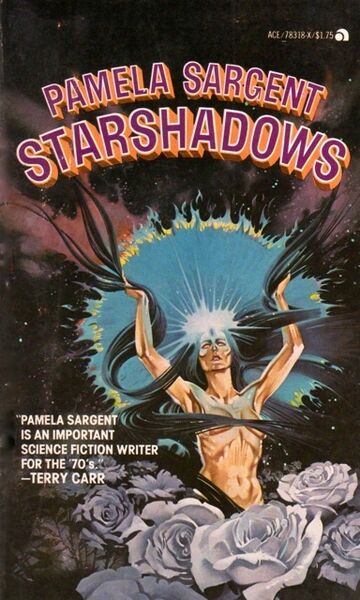Your Big Debut
Starshadows
By Pamela Sargent

27 Jul, 2025
Pamela Sargent’s 1977 Starshadows is a collection of science fiction stories.
If I have the chronology correct, this was Sargent’s debut collection and her fifth published book (after Women of Wonder (1975), Bio-Futures (1976) More Women of Wonder (1976) and Cloned Lives (1976). A novel, a collection, and three anthologies in two years is a perfectly reasonable pace [Editor’s note: !!!] for a novice author.
Sargent’s personal website is fairly barebones, but unlike some authors’ websites that I can mention, is maintained and up to date. It notes that Starshadows was originally called Starshadows and Blue Roses. Whether this is a pre-print title or an early edition is not clear, but I could find no evidence of any edition except the 1977 MMPB.
Sargent is a hard SF author in many senses of the term, except that she does not appear to have been closely affiliated with a certain largely West Coast community of conservative SF authors1. At the same time, some of the venues in which she appeared may lead one to wonder if she had been New Wave-adjacent. The stories are too reality based to be New Wave, but Sargent certainly has the dour worldview common in New Wave down pat.
Looking at the copyright, I note two details2. First, that Sargent sold to a diverse assortment of editors. Carr and Ferman in particular liked her work but Gerrold & Goldin, Michael Moorcock, Scotia & Yarbro, Jakobsson, and Elder also published Sargent. Notable by their absence: editors such as Bova and Baen.
Second, every story has a note to the effect that copyright was reassigned to the author in 1977. I wonder what the backstory is.
The tales are very 1970s. For example, extraordinarily pessimistic visions of cities abound; Americans of that era were often sure that cities were on the verge of collapse. At the same time, there’s an unstated conviction that problems may be manageable, given the proper technology rationally applied. This faith in the potential of rational thought may strike modern readers as odd, archaic, and inherently un-American3.
At the risk of being cynical, one might suspect the reason that Sargent isn’t more commonly used as an example of hard SF is a combination of not being closely affiliated with the West Coast crew, being a woman, and writing prose too alarmingly polished and populated with memorable characters.
Starshadows is out of print4.
A look in greater detail.
Introduction (Starshadows) • essay by Terry Carr
A glowing introduction from Carr, who was not known for anthologizing large numbers of women SF authors.
Shadows • (1974) • novelette
The aliens were technologically superior to humans. They had no use for Earth’s resources. Why then had they invaded, occupied the Earth and herded its human population into austere camps? Suzanne may find out, if she can live long enough.
The aliens are not great at communicating their intentions, although I suspect that even if they had, humans would not have willingly cooperated.
Suzanne’s boyfriend displays many flaws and few virtues.
“Gather Blue Roses” • (1972) • short story
A close sibling bond has serious drawbacks.
“Oasis” • (1971) • short story
Some might think that telepathic empathy would be a superpower, but it is in fact a disability that forces its possessor to go to extremes to limit the debilitating side-effects.
Are there enough stories about the downside of telepathy and empathy for a tor dot com article?
“Julio 204” • (1972) • short story
When medicine is outlawed, only outlaws will have medicine!
I really miss the days when it was possible to complain that world-building details were implausible. These days, who can rule out the current US regime deciding that medicine should be banned?
“IMT” • (1973) • short story
Matter transmission may not be able to save the doomed cities, but it could save civilization… provided that society can be prepared for it.
Marketing challenges include the fact that the man who invented IMT, the man who asserts it is perfectly safe, will not himself use it.
“Desert Places” • (1974) • short story
Shiftless rustics fall victim to the indifference of a more advanced culture.
“The Other Perceiver” • (1972) • short story
An alien offers humanity salvation… but in a very unappealing package.
“Bond and Free” • (1974) • short story
A young woman struggles to escape confinement, blissfully unaware why she and her kind have been sequestered from mainstream society.
This may be related to a particular Sargent novel, but I cannot tell you which one. That would be a spoiler.
“If Ever I Should Leave You” • (1974) • short story
Applied time travel complicates a passionate relationship.
Clone Sister • (1973) • novelette
A dissatisfied young man finds the support he needs from his clone sister.
This story was incorporated into Cloned Lives.
1: A West Coast group for whom I’d love a collective name. I mean Poul Anderson, Greg Bear, Larry Niven, Robert Forward, and their imitators and supporters.
2: Well, three. For some reason, the last line of each page is so close to the bottom of the page that some lines were cut off.
3: USA delenda est.
4: Starshadows overlaps less than one might hope with Masters of Science Fiction: Pamala Sargent, her new collection from Centipede Press. My plan to pick up that collection in ebook ran aground on the shoals of “Centipede is not Subterranean and does not offer ebook editions.”
